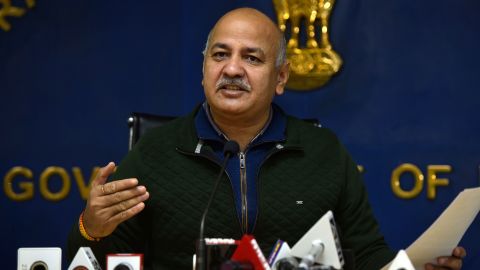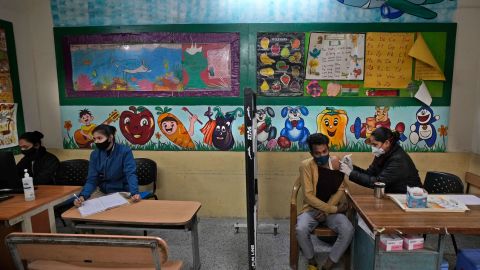[ad_1]
New Delhi
CNN
—
Dharini Mathur’s son had simply turned 4 when he began pre-school on-line. Greater than 600 days later, he nonetheless sits behind his laptop display, making an attempt to study nearly – whereas making zero contact together with his classmates and lecturers.
He’s one in all greater than 4 million kids in India’s capital, Delhi, compelled out of the classroom due to the coronavirus pandemic.
The continued mass closure, in response to Mathur, is severely affecting their means to study.
“Our little kids have been out of faculty, no peer interactions,” Mathur mentioned. “This isolation, and the shortage of growth that comes with that, is admittedly fairly important.”
The Delhi authorities ordered faculties shut in March 2020 when circumstances began creeping up throughout the nation. They’ve remained largely closed for almost two years.
It is likely one of the world’s longest faculty closures. And for a metropolis with evident disparities in growth amongst its inhabitants, the extended studying loss has led to issues it might improve poverty, scale back incomes capability, and lead to psychological and bodily stress to tens of millions.
In Delhi alone, tons of of 1000’s of youngsters from decrease revenue communities – who can not afford laptops and reside in cramped and unsanitary environments – are vulnerable to being denied an training altogether.
In August, Mathur petitioned the state authorities to reopen faculties. Almost six months later, Delhi officers met Thursday to debate a possible reopening.
Within the assembly, Delhi’s chief minister and his deputy proposed easing the restrictions to the capital territory’s Lieutenant Governor Anil Baijal, who has the ability to implement the modifications as head of the Delhi Catastrophe Administration Authority (DDMA).
Whereas the officers agreed to ease some anti-epidemic measures, together with revoking a weekend curfew and opening authorities places of work, faculties will stay shut.
“We closed faculty when it was not protected for kids however extreme warning is now harming our youngsters,” Delhi’s Deputy Chief Minister Manish Sisodia wrote on Twitter on Wednesday. “A era of youngsters can be left behind if we don’t open our faculties now.”
CNN has contacted Baijal’s workplace for remark however didn’t obtain a response.

India is second solely to Uganda with regards to Covid faculty closures.
In line with a report by the United Nations, India closed its faculties for 82 weeks – or 574 days – between March 2020 and October 2021. Uganda closed lecture rooms for 83 weeks.
However India’s faculty closures aren’t uniform throughout the nation, as every state is accountable for implementing their very own restrictions.
In March 2021, India’s authorities handed a controversial invoice giving sweeping powers to Delhi’s unelected lieutenant governor to approve all govt selections within the capital territory.
Baijal was appointed lieutenant governor by the ruling Bharatiya Janata Occasion (BJP) in December 2016.
On the time, Delhi’s elected Chief Minister Arvind Kejriwal criticized the legislation as “unconstitutional” and “anti-democracy,” claiming the BJP’s transfer would “drastically curtail” the powers of the consultant authorities.
Now, as the top of the DDMA, Baijal is accountable for drafting and implementing Covid-19 rules. For almost two years, he has saved Delhi faculties closed, citing well being issues.
Following its first closure in March 2020, Delhi faculties remained shut for the remainder of the 12 months. They reopened briefly in early 2021 – however have been compelled shut once more when India skilled its devastating second wave of infections in April that 12 months.
Colleges reopened in November as circumstances stabilized however then closed once more in December on account of extreme air air pollution. And a surge in Omicron circumstances has saved them shut in January.
The consequence has been “catastrophic” in response to Shaheen Mistri, founding father of non-profit group Train For India.
“The impression is on a number of ranges, the obvious being studying loss,” Mistri mentioned.
In line with Mistri, 10% of youngsters in Delhi’s authorities faculties have dropped out of training due to the pandemic and its financial impression on poorer households.
“Baby marriage has gone up, violence in opposition to kids has gone up, vitamin is a large challenge as a lot of our youngsters rely upon faculty meals,” Mistri mentioned. “The fact is we’re coming onto two years of faculty closure. Children have simply misplaced a lot studying.”
However the issue isn’t restricted to cities. A 2021 survey of 1,400 households by native NGO Street Scholarz discovered solely 8% of youngsters in rural India have been learning on-line commonly, whereas 37% weren’t learning in any respect – largely as a result of they don’t have entry to computer systems and smartphones.
Women are additional marginalized. In line with NGO Proper to Training Discussion board, an estimated 10 million secondary faculty ladies in India might drop out of faculty due to the pandemic – placing them vulnerable to poverty, youngster marriage, trafficking and violence.
“We should be ready that the impression of this can be very long-term,” Mistri mentioned.

Mathur’s son met his trainer on-line in March 2020. On the time, the boy didn’t know learn or kind and had by no means used video conferencing earlier than.
“It broke our coronary heart to see him struggling on Zoom daily,” Mathur mentioned. “He needed to unmute when he needed to talk, and mute when he wasn’t talking. He needed to learn to write on-line. How do you learn to maintain a pencil on-line?”
And he by no means obtained the prospect to satisfy his classmates both. Mathur is frightened the childhood of her son’s life – arguably a few of the most important – are in jeopardy due to the closures.
“We’re actually frightened about his social growth,” Mathur mentioned. “He’s by no means had an opportunity to learn to work together with kids his age. As a lot as we attempt to give him that, there’s no place like faculty.”
Rubita Gidwani’s 13-year-old daughter was additionally compelled out of the classroom due to the pandemic – and she or he says the price of the closures are obvious.
“The anxiousness that kids are dealing with provides as much as much more,” Gidwani mentioned. “You need a joyful youngster. You need a youngster to develop total. And I believe that has been impacted.”
In an announcement Thursday, the United Nation’s Youngsters’s Fund urged “governments to do every thing of their energy” to reopen faculties.
“We want daring motion to allow each youngster to return to high school,” the UNICEF assertion mentioned. “This contains offering complete help with a specific give attention to marginalized kids in every group, reminiscent of catch-up lessons, psychological well being and vitamin help, safety and different key companies.”
In September 2020, the World Well being Group (WHO) mentioned faculty closures have “clear adverse impacts on youngster well being, training and growth.”
In line with WHO, kids and adolescents often display fewer and milder Covid-19 signs in comparison with adults, and are much less seemingly than adults to expertise extreme Covid.
Between December 2019 and October 2021, kids underneath age 5 represented 2% of reported world Covid circumstances, whereas older kids ages 5 to 14 accounted for 7% of worldwide reported circumstances, WHO mentioned in an announcement in November final 12 months.
Nevertheless, new, probably quick spreading variants, reminiscent of Omicron, have led to renewed issues worldwide over the dangers confronted by kids within the classroom – and their function in spreading the virus.
In latest months, the UK, components of Europe and america, have all seen an increase in pediatric infections linked to Omicron. The uptick has threatened to disrupt plans to reopen faculties. Within the US, the Biden administration has insisted faculties are “greater than geared up” to remain open, although some elected officers are erring on the aspect of warning by delaying the brand new time period.
In India, greater than two thirds of the inhabitants could have already got some stage of immunity in opposition to Covid-19, in response to a July 2021 serological survey from the government-run Council of Medical Analysis (ICMR).
“Greater than half of the kids (6 to 17 years outdated) have been sero-positive, and sero-prevalence was comparable in rural and concrete areas,” ICMR director basic Balram Bhargava mentioned in July.
Vaccinations have additionally began for kids above age 15, with greater than 43 million having acquired their first dose as of Thursday.
However as faculties in different Indian states regularly reopen, Delhi’s lecture rooms stay shut. In an announcement Wednesday, Delhi’s Deputy Chief Minister Sisodia mentioned on-line studying can by no means substitute offline research. “Throughout Covid, our precedence was kids’s security,” he mentioned, including it was essential to reopen faculties.
For Mathur, the difficulty goes past Covid.
“We as mother and father consider that our youngsters lack a voice, they lack a vote,” she mentioned. “Somebody wants to talk up on behalf of our youngsters.”
[ad_2]
Supply hyperlink